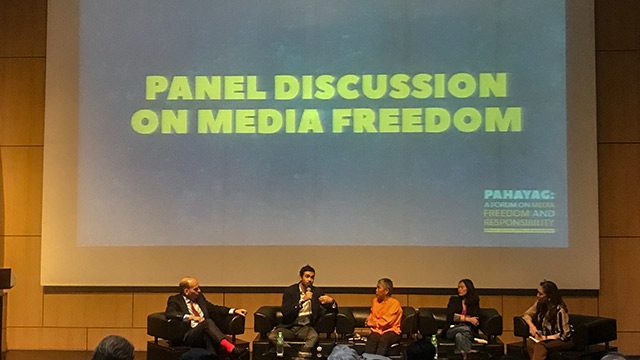SUMMARY
This is AI generated summarization, which may have errors. For context, always refer to the full article.

MANILA, Philippines – Days ahead of World Press Freedom Day celebrated on May 3, the British and Canadian embassies organized Pahayag: A Forum on Media Freedom and Responsibility at the Ateneo de Manila University.
The forum, held on Monday, April 29, is part of a larger effort of the two governments to shed light on the issues of press freedom and responsibility around the globe. The United Kingdom (UK) and Canada are hosting a two-day international press freedom conference in London in July.
During the forum, British Ambassador Daniel Pruce and Canadian Ambassador John Holmes affirmed the role of a free and responsible media in democratic societies.
“A free and responsible media is fundamental to an open and democratic society, holding the powerful to account, speaking up for those who have no voice, and fighting corruption. In fact, no society can ever be free if it’s media is not,” said Pruce.
Holmes, for his part, said, “By presenting well-researched and documented facts in a professional manner, journalists are on the frontline in the battle for truth, they are in the frontline on the fight against disinformation and they are in the frontline in preserving democracy.”
Threats to freedom
Pia Ranada, Rappler’s Malacañang reporter, was one of the keynote speakers at the forum. She spoke about Duterte’s ban on Rappler’s coverage of presidential events.
“We feel like we’re being criminals for being journalists. We have to disguise ourselves just to cover the President. [It] feels like [we’re] deceiving everyone when journalists are supposed to be transparent,” she said.
Ranada has been banned from covering Duterte’s public events since February 2018. On Thursday, April 11, Rappler filed a petition before the Supreme Court seeking an end to the ban, which had been extended to all Rappler reporters and correspondents.
“We can see that there are different ways that dictators and dictator-like leaders try to silence the media. This time, we see a different playbook,” Ranada said during the panel discussion on media freedom. The blatant silencing of the media under the Duterte administration is more subtle and thus more insidious, she said.
Pruce said such actions had created “an environment where verbal attacks on the media [are allowed], creating a context where it’s okay to denigrate journalists, although attempting to use what appears to be due process to camouflage what is in fact harassment.”
Aside from Ranada, freelance journalist Inday Espina Varona and British Broadcasting Company (BBC) Philippines correspondent Howard Johnson were part of the panel discussion on the state of press freedom in the country.
Johnson talked of threats and hate messages he received for reporting on Duterte’s bloody drug war and the state of Philippine democracy.
Unfazed, Ranada said: “There are truths that are ugly. We report the truth pretty or ugly…. We report public interest issues. We don’t differentiate if that’s good or bad.”
‘Gatekeeping protects readers’
“Gatekeeping protects readers, to some extent, from false information,” said Luis Teodoro, a member of the Board of Trustees of the Center for Media Freedom and Responsibility (CMFR), who was part of the panel discussion on media responsibility.
The former dean of the University of the Philippines College of Mass Communications also cited the importance of editorial vetting, which does not happen in social media posts. “While there is an upside to social media, there is [also] a downside – anybody can say whatever he wants without anyone vetting,” Teodoro said.
Philippine Daily Inquirer associate publisher Juliet Labog-Javellana, for her part, said that “gatekeeping is important.”
“We have to exercise editorial judgment for public interest, for the greater good,” she said.
Two topics were given attention in light of gatekeeping and media responsiblity: the President’s new drug list released in March and the “oust Duterte” plot matrix published in The Manila Times this April. Manila Times managing editor Felipe Salvosa II had resigned over the publication of the said matrix.
On the so-called Duterte narco list, Teodoro said while reporting on the existence of the list was a responsibility of the media, so was keeping the anonymity of the persons on that list. (READ: Journalists urged not to aid trial by publicity over narco list)
“The names should not have been mentioned. The reason for that is there is such a thing as the presumption of innocence and there’s also the fact that you can destroy reputations by just mentioning [names],” he said.
Javellana said that when the Inquirer published Duterte’s first narco list in August 2016, it did fact-checks and background research on the names for verification and published the names.
On the matter of the matrix, Teodoro said that the list should not have been published in the first place, as it was not journalism but rather public relations.
“You have a report that there is this claim, but you have to provide the background…. The backgrounding is crucial,” he said.
“The fundamental task of a journalist is to tell the truth, and in order to do that you have to verify,” Teodoro added.
He also summed up the importance of journalism in a country like the Philippines, where press freedom is under threat: “Journalism in the Philippines is a dangerous profession. But journalism is a necessary enterprise in a democratic society.” – Rappler.com
Add a comment
How does this make you feel?
There are no comments yet. Add your comment to start the conversation.